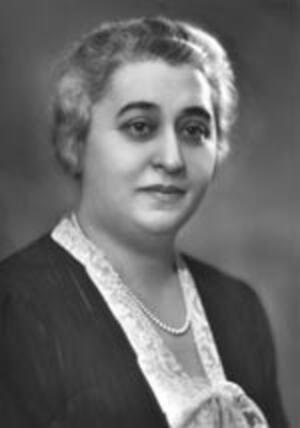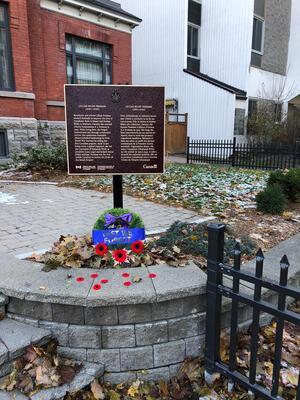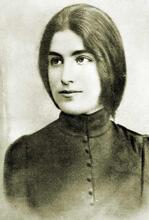Lillian Freiman
Unquestionably the most prominent Jewish woman in Canada in the interwar period, philanthropist and Zionist Lillian Freiman (1885 – 1940) served as head of Canadian Hadassah-WIZO for twenty-one years and was the first Canadian Jew to be awarded the Order of the British Empire.
Photographer: Paul Horsdal.
Institution: Canadian Jewish Congress National Archives, Montreal.
The most prominent Jewish woman in Canada in the interwar period, Lillian Freiman was exemplary for her degree of independent social activism and devotion to an array of causes. She challenged both the Liberal and Conservative Canadian governments’ restrictive, nativist immigration regulations. At the same time, she was a leader among Jewish and non-Jewish social causes, applying hands-on ingenuity alongside social access, which was unique for a Canadian Jewish woman of her time. She and her husband spearheaded Canadian Zionism, he as president of the Zionist Organization of Canada and she was head of Canadian Hadassah-WIZO. Canada’s iconic veterans’ commemoration, the poppy, was one of Freiman’s early successes.
Early Life and Family
Unquestionably the most prominent Jewish woman in Canada in the interwar period, Lillian Freiman was born in Mattawa, Ontario, on June 6, 1885, one of the eleven children of Moses Bilsky (1829–1923) and his wife, Pauline (née Reich, b. Berlin, 1857, m. 1875). Like many Canadian Jews, Moses Bilsky, who was born in Lithuania, moved back and forth between Canada and the United States for a number of years. Arriving in Canada as a child in 1845, he was in British Columbia during the Cariboo Gold Rush and then headed for California, Panama, and back to California. During the American Civil War he was a Union soldier. His wife was a homemaker. In Canada, the Bilskys were pioneers of the Jewish community of Ottawa, where they settled after Moses had achieved financial success in the lumber business in Mattawa. For many years, Moses was Ottawa’s most eminent Jewish citizen, while their home played the unusual role of first stop for needy Jewish newcomers to the city.
Lillian Freiman lived most of her life in Ottawa. At the age of eighteen she married Lithuanian-born Archibald J. Freiman (1880–1944), founder in 1900 of the major Ottawa department store Freimans. His success mirrored the role of Jews in retailing in the United States and Germany. A.J. Freiman’s business acumen was matched by activities related to Jewish communal and immigrant aid. The Freimans had three children: Dorothy (Alexandor, 1906–1986), Lawrence (1909–1986), and Queene Esther (Luxenberg, 1912–1997), and they adopted a Ukrainian-born orphan, Gladys (Rozovsky).
Jewish Involvement
Though not yet thirty years old at the outbreak of World War I, Lillian Freiman established herself as a civic leader in Ottawa and a national leader of Canadian Jewry. Her influence was unusually broad, based on her Ottawa connections, which included the Liberal Prime Minister Mackenzie King and the Conservative, R.B. Bennett. When Freiman led a campaign for the United Palestine Appeal in 1934, she brought Bennett on board for a radio speech that inaugurated the fundraising program. King, writing in his diary in 1932, described his visit to the “Jewish synagogue” in Ottawa for the wedding of the Freimans’ daughter, followed by the reception at their house on Somerset Street.
Freiman’s activist and organizing work was uniquely ecumenical in its range. It relied on her social access but was characterized by hands-on involvement; in this way, she was not a typical philanthropist doling out funds. Her interactions with leading figures in Canadian government remained largely off record, allowing her full range of influence and activity to go relatively unremarked in mainstream biographies and historiography.
A guiding focus was her attentiveness to the calamitous life of Jews in the Russian lands, Ukraine, and eastern Poland following World War I. She led the campaign to bring to Canada 150 Jewish war orphans (Gladys Rozovsky was one) from the Ukraine to settle them with Jewish families. This was accomplished in the face of drastically limited access to Canada by Jewish immigrants, and her efforts included her travel with the children from Antwerp to Canada. In the early 1920s, Freiman’s access to the Canadian Immigration and Justice departments prevented the deportation of hundreds of Jews, newly landed at the port of Halifax. Throughout the 1930s, her office at her family home was a de facto shadow office of the expansive work being done by Jewish Immigration Aid workers in Ottawa, Montreal, and western Canada. People from across the country wrote to her directly with requests for aid in getting family members into the country. She often responded successfully, even in the face of ever-stiffening immigration regulations engineered by Liberal and Conservative governments and bureaucratic resistance from the notorious Immigration Commissioner F.C. Blair.
Civic Affairs
Aside from activities on behalf of Canadian and European Jews, Freiman’s activism took on what we would recognize today as a cross-cultural impetus. A Red Cross sewing circle, which began in her home, evolved into the Disraeli Chapter of the Daughters of the Empire. When the 1918 Ottawa flu epidemic needed a coordinator to respond to the crisis, she camped out at a city office where she managed the job. She was President of the Ottawa Girl Guides Foundation; Vice President of the Ottawa Branch of the Canadian National Institute for the Blind; President of the Ladies Auxiliary of the Perley Home for Incurables in Ottawa; and most famously, the originator of the European poppy movement in Canada in support of veterans, which led to early instances of Canadian poppies being made in her home. Because of her work with war veterans, she was granted honorary life membership in the Canadian Legion veterans’ organization, the first woman to be so honored. Alongside these commitments, Jewish community work included the Ladies Hebrew Benevolent Association, the Ladies Auxiliary of Adath Jeshurun Congregation, the Orthodox synagogue to which the family belonged, and the Ladies Auxiliary of B’nai Brith, all in Ottawa.
It is the breadth of her work for Canadian causes that led Freiman to be named a “National Historic Person” by the Government of Canada in 2018. The plaque honoring this designation, installed in front of the Somerset house (now the Canadian Army’s Officers’ Mess), acknowledges her efforts at forging “intercultural ties through community service.”
Zionism
Freiman’s philanthropic efforts were widely diffused, but Zionism received her concerted attention. Although people of her wealth and position in the United States seldom allied themselves with Jewish nationalism, in Canada Zionist affiliation was broadly popular in the pre-World War II period; from World War I until their deaths, she and Archibald spearheaded Canadian Zionism, he as president of the Zionist Organization of Canada and she as head of Canadian Hadassah-WIZO. Their son, Lawrence, also served as president of the ZOC.
At the end of World War II, Freiman undertook to raise money for the Helping Hand Fund of Hadassah. Traveling coast to coast, she secured about $200,000, a prodigious and unprecedented sum in a community of some 120,000 Jews, many of them recent immigrants. She was instrumental in bringing Hadassah, the women’s Zionist organization founded by Henrietta Szold, to Canada from the United States. Later, she influenced the Canadians to affiliate with WIZO, which had its headquarters in Britain, rather than with American Hadassah. The British orientation seemed more natural in Canada with its still strong ties to the mother country, which also held the mandate for Palestine. From 1919 to 1940, Freiman served as Dominion president of Canadian Hadassah-WIZO. In 1934 she became the first Canadian Jew to be awarded the Order of the British Empire.
The Diaries of William Lyon Mackenzie King. January 3, 1932. https://www.bac-lac.gc.ca/eng/discover/politics-government/prime-ministers/william-lyon-mackenzie-king/Pages/search.aspx. Accessed July 10, 2020.
Government of Canada. “Government of Canada recognizes National Historic
Significance of social advocate Lillian Bilsky Freiman.” https://www.canada.ca/en/parks-canada/news/2018/10/government-of-canada-recognizes-national-historic-significance-of-social-advocate-lillian-bilsky-freiman.html Accessed July 8, 2020.






